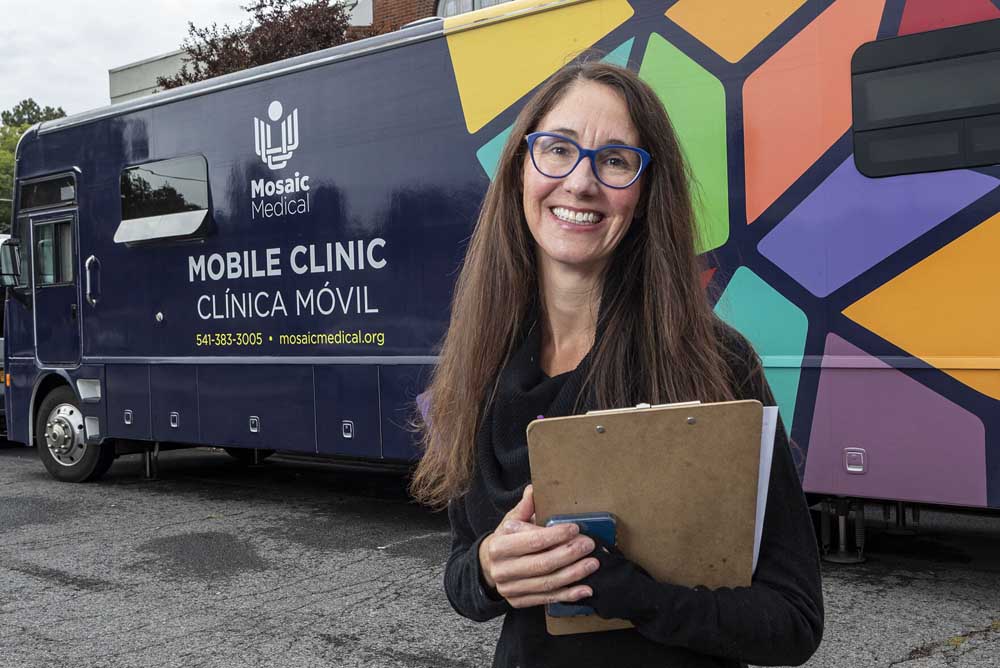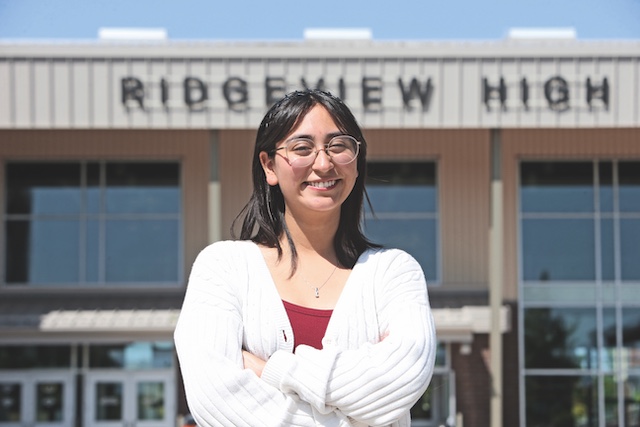Mosaic Medical celebrates 20 years in Central Oregon
Published 2:30 pm Saturday, September 24, 2022

- Megan Haase, family nurse practitioner and CEO of Mosaic Community Health, formerly known as Mosaic Medical, stands in front of the health center's mobile clinic during a stop in downtown Bend.
Seventeen years ago, a pregnant Luz Monroy, of Redmond, needed medical help.
An immigrant who only spoke Spanish, Monroy also had no health insurance.
But Mosaic Medical took care of her. The Federally Qualified Health Clinic found ways to help her through her labor and delivery. Later, it helped her when she needed health care for a gall bladder issue, and help with managing her diabetes.
Monroy, an in-home, self employed child care provider, has gone to the Redmond clinic for ultrasounds and medical procedures, COVID-19 tests and vaccinations.
Never once was she made to feel like she was asking too much when she couldn’t afford to pay.
And everything is done in her native language, Spanish, she said through a Mosaic Medical translator, Jason Villanueva.
“Everything is done in Spanish. The paperwork is in Spanish. The doctor speaks Spanish. That has left an impression on me,” Monroy said. “And there’s always a translator available.”
It’s all in a day’s work at Mosaic, which began in the two room Ochoco Community Clinic in Prineville in 2002. Today, it’s grown into a 14-clinic, three county community health health center serving Medicaid or uninsured patients by providing an ever growing range of medical services to the community. This year marks the nonprofit clinic’s 20th anniversary.
Scott Cooper, former Mosaic board of director and now executive director of NeighborImpact, said the community values that started the health center are the same ones present today: Help people in need to maintain a healthy lifestyle.
From the beginning, Mosaic has wanted to serve the immigrant community in Central Oregon, Cooper said. It took vision to create a Federally Qualified Community Health Center, which receives funding from the Public Health Services Act through the U.S. Health Resources and Services Administration. The designation allows the health center to open in traditionally underserved communities and maintain a mission of being the safety net.
As part of the designation, Mosaic must re-assess its mission and determine if it’s meeting the needs of the community, Cooper said.
“Mosaic provides huge coverage around our region with services,” Cooper said. “Prior to Mosaic, there was always chronic conversations about the unmet health needs of the community. Now we just send people to Mosaic.
“It’s one of the gems of Central Oregon.”
Mosaic’s primary principle is to help everyone who comes in the door, said Megan Haase, Mosaic Medical CEO and family nurse practitioner. Haase, who was Mosaic’s second medical provider in the Prineville clinic, has worked her way up the ranks and became the CEO in 2010, leading the clinic’s expansion and team-based care model.
Haase calls the approach barrier busting. Everyone deserves access to quality health care that is affordable, and accessible, she said. Over the years, through outreach Mosaic has formed relationships with housing groups, schools and mental health centers. Those relationships work together to break the barriers, Haase said.
“There is such a need in Prineville when we started and the community wanted to remove the barriers,” Haase said. “They were then and still are committed to meeting the needs that existed across Central Oregon.
“The impact we’re having on families every single day are life changing. To be a part of an organization like that is a job and an honor.”
When patients can’t make their way to a clinic, Mosaic brings the clinic to them. One of the services is housed in a RV that goes to homeless camps to help that segment of the community. Recently the clinic added dental and prescription drugs, two areas that have a high need in the community.
According to the nonprofit’s tax documents, about half of Mosaic patients in 2021 were were on Medicaid, a quarter on commercial insurance, 15% were receiving Medicare and 10 percent were uninsured.
By being a Federally Qualified Community Health Center, Mosaic can serve everyone, regardless of the ability to pay, said Linda Hatch, a Mosaic Medical family nurse practitioner who became involved with the founding of the clinic by reaching out to Crook County community leaders.
That first year, Mosaic saw 700 patients. Last year it saw 27,000 patients.
In 2021, the year data are most current, there were an estimated 19,200 people without health insurance in Deschutes and Crook counties, or about 7% of the population, according to data from the American Community Survey.
Providing access to a community’s uninsured or low income plays a role in the economy, said Jake Procino, Oregon Employment Department workforce analyst, for the East Cascade region. In general, access to healthcare has positive effects on the community because healthy workers are more productive on the job and miss fewer workdays.
“I never envisioned that we’d be out there breaking down the barriers to care,” said Hatch, who still sees patients. “I stayed with Mosaic because it’s about helping people. We are here to help people and meet them at their level.
“I’ve been here so long that I can see people making improvements and getting better because of the access to healthcare.”
Because the community health nonprofit sees anyone, regardless of the ability to pay, groups like NeighborImpact and the Latino Community Association work closely, often referring potential patients.
“Our federally qualified health center, Mosaic Medical, plays a huge role in ensuring access to affordable healthcare for many of our immigrant families and others without health insurance,” said Brad Porterfield, Latino Community Association executive director. “They have a significant number of staff and doctors who speak Spanish and who believe everyone deserves quality medical care regardless of their ability to pay for it.”
Those Spanish speakers help people like Monroy. During the pandemic, often the nutritionist would check in on her to ensure she had what she needed to monitor her diabetes, she said. Another time, when she couldn’t get to the pharmacy, Mosaic made sure her medication was delivered.
“I am very happy with the services I receive,” Monroy said. “There’s no reason for me ever to stop going.”
Mosaic Medical, a federally qualified health center, operates 14 clinics around Central Oregon including four main health centers in Bend, Madras, Prineville and Redmond and 10 satellite clinics that include five school-based health centers and one mobile unit. Mosaic sites that include full dental sites are in Bend, Madras and Redmond. Mosaic also operates three retail pharmacies in Prineville, Madras and Bend.
The following is a timeline of key expansion events:
2002: Opened its first federally qualified health center clinic in Prineville.
2005: Opened a clinic in Bend.
2006: Opened a clinic in Madras.
2012: Opened a clinic in Redmond.
2020: Opened first pharmacy in Prineville.
Source: Mosaic Medical




